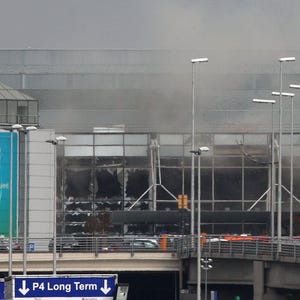Authorities in Brussels, Belgium arrested Salah Abdeslam Friday. He was the top fugitive in last year's attacks in Paris that killed 130 people. (March 18) AP
Paris terror attack suspect discovered hiding in Brussels neighborhood police searched for months.
PARIS — For four months, the top minds and most lethal guns in the combined security forces of France and Belgium, not to mention the computer services of Interpol , have bent every resource toward unearthing one individual: the logistical mastermind of the Paris terrorist attacks that left 130 dead last November.
On March 15, four members of a Belgian anti-terrorist squad, accompanied by twoFrench liaison officers, knocked on a door in an Arab-dominated neighborhood ofBrussels . It was a routine “verification of domicile” in an apartment identified as “cold” — unoccupied, water and electricity cut for weeks. But this routine door knock uncovered the first trace of Salah Abdeslam since he slipped through the porous French-Belgium border the day after the Paris attacks — a single fingerprint on a water glass left behind as the inhabitants fled, which incidentally it took two days to identify. Friday, Abdeslam was seized in a mass raid in the same Arab quarter where he had grown up and where he had apparently been hiding for months, in all but plain sight.
Four days later, three massive bombs tore through the main departure hall of Brussel’s airport and a metro station in the heart of the capital, killing at least 31 people and wounding more than 150. If there was a message there, it is that when it comes to terrorist breakthroughs, there can be no victory laps.
One stark reality was lost amid the first ecstasy of success in capturing, alive, Europe’s single most wanted fugitive. How was this possible — that he could remain concealed so close to home for so long? Above all, what does that mean for the ability to uncover more such plots still being hatched in Europe or the United States?
The first item for Abdeslam’s interrogators will be to determine just how wide his net might be, information that not surprisingly was hardly forthcoming before the latest terrorist atrocity. But Abdeslam's information won't likely be all that wide or deep. Small cells, operating autonomously, seem to be the rule. Any number of such cells could be lurking out there, each operating independently with its own lethal mission. Tuesday’s airport and metro bombers could very well be just such an operation. Per capita, there are more Belgian extremists — over 400 — who’ve made their way to the battlefields of Syria and the ranks of the Islamic State terrorist group than from any other country, while France, Britain and Germany lead in terms of absolute number of ISIL recruits from European countries.
It would be useful for the prime minister of Belgium and the president of France to take a hard look at just why Abdeslam was able to remain on the loose for so long under the noses of those turning over what they thought was every rock. An instructional exercise on both sides of the Atlantic.
For a time, after the November bloodbath, there was talk of “no go” zones in major European cities — areas, particularly Arab-dominated — where police have been unable to penetrate routinely, without the kind of massive show of force that preceded the seizure of Abdeslam. The reality is that these zones are less places cops don’t dare go than places where they get few useful results when they do show up. The police, quietly, with sensitivity and understanding, with a deep knowledge of the languages and customs of each such neighborhood, need to be there all the time. And they’re not.
More than 20 years ago, Count Alexandre de Marenches, longtime head of French intelligence , told me that the greatest threat to his nation’s security was “an entire nation living within our country whose language we do not speak, whose customs and religion, whose hopes and fears we do not understand.” He was referring, even then, to the Islamic communities that have only multiplied in recent years and promise to multiply even further with the arrival of thousands of new refugees from Syria, Iraq and Afghanistan.
POLICING THE USA: A look at race, justice, media
It’s a question worth posing not only in Francophone Europe but in the United States as well — the danger of the multiplication of communities where little intelligence emerges and few forces of order are truly plugged in.
In the specific case of Abdeslam, there’s the excuse that French-speaking andFlemish -speaking Belgian cops have difficulty communicating, and that neither group has much expertise in Arabic. There are other issues as well — the conflict, particularly in France, between domestic and international intelligence agencies, historically all too often at odds.
All these are issues worth an urgent look in the United States. In the U.S., ISIL sympathizers can’t simply jump in a car as in Iraq or Syria, pass porous frontiers and in a matter of days wind up in sympathetic communities only blocks from the targets of potentially deadly attacks. Even so, America, too, must understand enemies sheltering among us. Complacency in America may be as deadly a sin as ignorance in Europe.


No comments:
Post a Comment